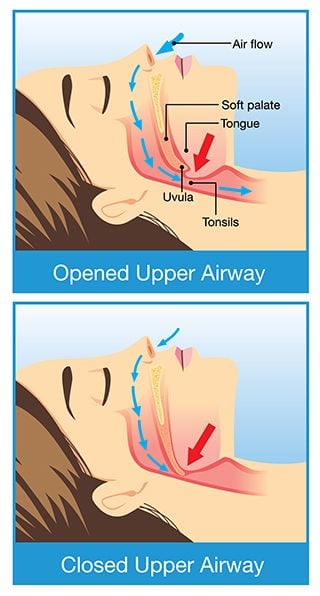Is it snoring or sleep apnea?
 Snoring occurs when soft tissues in the throat area relax during sleep, partially blocking airways and vibrating with the passage of air. It’s this vibration which causes that distinctive snoring sound. If you’re one of the millions of people who snore, you know how those nocturnal noises can interfere with your peaceful sleep and the sleep of those around you.
Snoring occurs when soft tissues in the throat area relax during sleep, partially blocking airways and vibrating with the passage of air. It’s this vibration which causes that distinctive snoring sound. If you’re one of the millions of people who snore, you know how those nocturnal noises can interfere with your peaceful sleep and the sleep of those around you.
Snoring can also be a symptom of sleep apnea, which is a serious medical condition. The word “apnea” is derived from the Greek word for “breathless.” When you suffer from sleep apnea, you briefly stop breathing during sleep.
Your body responds by waking every time you need to begin breathing properly again, often causing you to choke or gasp for breath. This cycle can repeat dozens of times per hour. While you may think you’ve slept through the night, you have never gotten the deep sleep your body needs to restore itself mentally and physically.
Types of Sleep Apnea
- Obstructive Sleep Apnea (OSA)
Obstructive sleep apnea is the most common form of sleep apnea and is caused by an obstructed airway. The throat muscles may relax as you sleep, making it impossible to inhale fully with each breath. Obstruction can also be caused by a physical condition such as a deviated septum, excess throat tissue or enlarged tongue or tonsils. The size and position of your jaw can affect your breathing as well.
- Central Sleep Apnea (CSA)
Central sleep apnea occurs when your brain fails to send the proper signals to the muscles which control breathing. Sleepers with CSA either stop breathing momentarily or take such shallow breaths that they can’t get sufficient air into their lungs.
- Complex Sleep Apnea
Complex sleep apnea combines features of both obstructive and central sleep apnea.
While men are more likely to develop this condition, sleep apnea can affect anyone. Factors such as obesity, increasing age, alcohol use, certain medications and drugs, medical conditions, and a family history of sleep apnea can also increase the risk of developing OSA and CSA.
How Sleep Apnea Affects Your Life
You (or your partner) may suspect sleep apnea if your sleep is interrupted by frequent loud snoring, choking, or snorting sounds, or if you appear to stop breathing or wake up short of breath throughout the night.
Sleep apnea affects your waking life as well. You might feel frequent daytime drowsiness or fatigue. You could have difficulty falling asleep at night or fall asleep involuntarily during the day. You might experience morning headaches or a sore throat or dry mouth when you wake up. Your quality of life can suffer, as insufficient sleep can lead to:
- Moodiness
- Frustration
- Depression
- Decreased libido
- Memory problems
- Inability to focus
If you have any of the symptoms of sleep apnea, you should seek prompt treatment. Sleep apnea can seriously impact health, and has been linked to an increased risk of:
- High blood pressure
- Heart disease
- Stroke
- Dangerous reactions to medications
- Dangerous reaction to general anesthesia
- Accidents and injuries caused by fatigue and slower reaction time
What kind of treatments are available?
Treatments ranging from behavior modification to surgery are tailored to the cause and the severity of your sleep apnea:
- Behavior modification: Losing weight, abstaining from alcohol, changing sleep position, and monitoring medications that affect sleep can be effective in mild cases of OSA.
- Oral appliances: These comfortable, custom-fitted devices can advance the jaw or hold the tongue forward to maximize airway space.
- Continuous Positive Airway Pressure (CPAP) machines: For those with moderate to severe sleep apnea, PAP machines provide pressurized air through a tube attached to a mask, delivering a gentle flow of air to keep airways open through the night.
- Surgery: Surgical procedures can remove or reduce the obstructions causing OSA. Medical implants have been successful in treating both OSA and CSA for patients who qualify for these treatments.
If you suspect your snoring is something more than a nightly nuisance, ask your dentist or doctor for a referral to a sleep apnea specialist. Proper diagnosis and treatment can help you enjoy the restorative sleep you need for healthier days and healthier nights.
